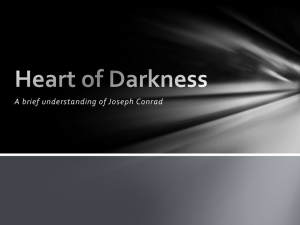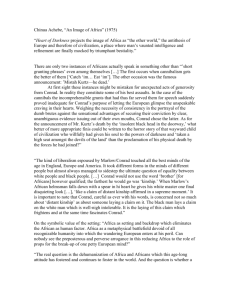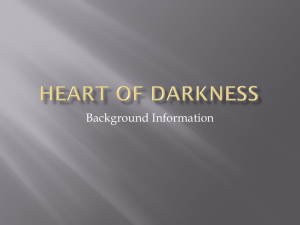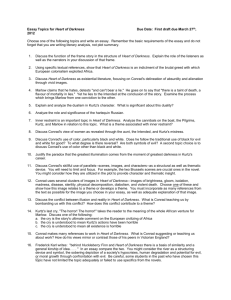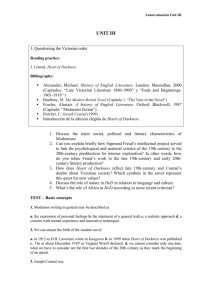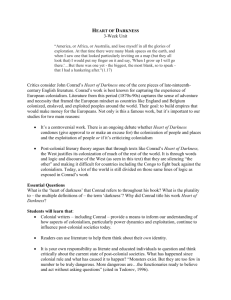File
advertisement
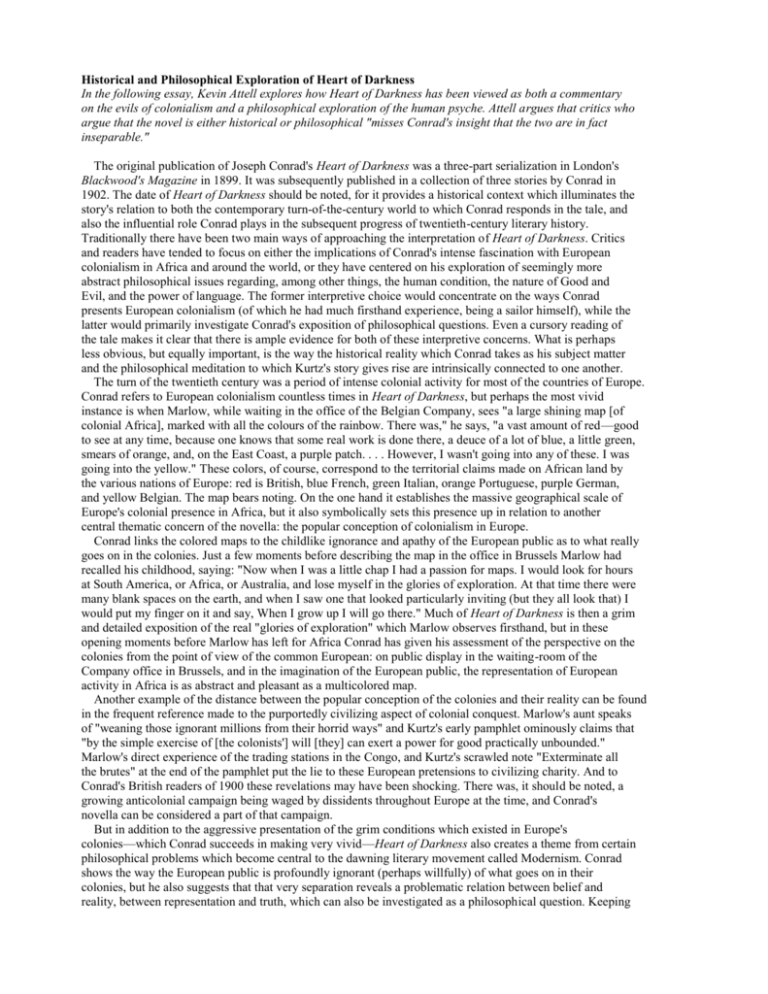
Historical and Philosophical Exploration of Heart of Darkness In the following essay, Kevin Attell explores how Heart of Darkness has been viewed as both a commentary on the evils of colonialism and a philosophical exploration of the human psyche. Attell argues that critics who argue that the novel is either historical or philosophical "misses Conrad's insight that the two are in fact inseparable." The original publication of Joseph Conrad's Heart of Darkness was a three-part serialization in London's Blackwood's Magazine in 1899. It was subsequently published in a collection of three stories by Conrad in 1902. The date of Heart of Darkness should be noted, for it provides a historical context which illuminates the story's relation to both the contemporary turn-of-the-century world to which Conrad responds in the tale, and also the influential role Conrad plays in the subsequent progress of twentieth-century literary history. Traditionally there have been two main ways of approaching the interpretation of Heart of Darkness. Critics and readers have tended to focus on either the implications of Conrad's intense fascination with European colonialism in Africa and around the world, or they have centered on his exploration of seemingly more abstract philosophical issues regarding, among other things, the human condition, the nature of Good and Evil, and the power of language. The former interpretive choice would concentrate on the ways Conrad presents European colonialism (of which he had much firsthand experience, being a sailor himself), while the latter would primarily investigate Conrad's exposition of philosophical questions. Even a cursory reading of the tale makes it clear that there is ample evidence for both of these interpretive concerns. What is perhaps less obvious, but equally important, is the way the historical reality which Conrad takes as his subject matter and the philosophical meditation to which Kurtz's story gives rise are intrinsically connected to one another. The turn of the twentieth century was a period of intense colonial activity for most of the countries of Europe. Conrad refers to European colonialism countless times in Heart of Darkness, but perhaps the most vivid instance is when Marlow, while waiting in the office of the Belgian Company, sees "a large shining map [of colonial Africa], marked with all the colours of the rainbow. There was," he says, "a vast amount of red—good to see at any time, because one knows that some real work is done there, a deuce of a lot of blue, a little green, smears of orange, and, on the East Coast, a purple patch. . . . However, I wasn't going into any of these. I was going into the yellow." These colors, of course, correspond to the territorial claims made on African land by the various nations of Europe: red is British, blue French, green Italian, orange Portuguese, purple German, and yellow Belgian. The map bears noting. On the one hand it establishes the massive geographical scale of Europe's colonial presence in Africa, but it also symbolically sets this presence up in relation to another central thematic concern of the novella: the popular conception of colonialism in Europe. Conrad links the colored maps to the childlike ignorance and apathy of the European public as to what really goes on in the colonies. Just a few moments before describing the map in the office in Brussels Marlow had recalled his childhood, saying: "Now when I was a little chap I had a passion for maps. I would look for hours at South America, or Africa, or Australia, and lose myself in the glories of exploration. At that time there were many blank spaces on the earth, and when I saw one that looked particularly inviting (but they all look that) I would put my finger on it and say, When I grow up I will go there." Much of Heart of Darkness is then a grim and detailed exposition of the real "glories of exploration" which Marlow observes firsthand, but in these opening moments before Marlow has left for Africa Conrad has given his assessment of the perspective on the colonies from the point of view of the common European: on public display in the waiting-room of the Company office in Brussels, and in the imagination of the European public, the representation of European activity in Africa is as abstract and pleasant as a multicolored map. Another example of the distance between the popular conception of the colonies and their reality can be found in the frequent reference made to the purportedly civilizing aspect of colonial conquest. Marlow's aunt speaks of "weaning those ignorant millions from their horrid ways" and Kurtz's early pamphlet ominously claims that "by the simple exercise of [the colonists'] will [they] can exert a power for good practically unbounded." Marlow's direct experience of the trading stations in the Congo, and Kurtz's scrawled note "Exterminate all the brutes" at the end of the pamphlet put the lie to these European pretensions to civilizing charity. And to Conrad's British readers of 1900 these revelations may have been shocking. There was, it should be noted, a growing anticolonial campaign being waged by dissidents throughout Europe at the time, and Conrad's novella can be considered a part of that campaign. But in addition to the aggressive presentation of the grim conditions which existed in Europe's colonies—which Conrad succeeds in making very vivid—Heart of Darkness also creates a theme from certain philosophical problems which become central to the dawning literary movement called Modernism. Conrad shows the way the European public is profoundly ignorant (perhaps willfully) of what goes on in their colonies, but he also suggests that that very separation reveals a problematic relation between belief and reality, between representation and truth, which can also be investigated as a philosophical question. Keeping in mind the way this problem has been introduced in the novella (ie. the specific relation between Europe and its colonies), let us briefly sketch out the philosophical and literary attempts to address the problem of representation in Modernism. Roughly speaking, Modernism had its peak in the years between World War I and World War II. The great canonical Modernists include such writers as James Joyce, Ezra Pound, Gertrude Stein, Virginia Woolf, William Faulkner, and others. In most accounts of the period what links the Modernist writers loosely together is their intensive formal experimentation with literary and linguistic techniques; that is to say, their experimentation with the actual modes of literary representation. Stein's experiments with syntax, Joyce's melding of languages and myths, Faulkner's endless sentences, can all be seen as various ways of working through difficult questions raised about the very nature of language and how it works. Language in Modernist literature is no longer seen as a stable vehicle for the communication of meaning, but rather it is put up for radical questioning in itself Modernist experimentation, one might say, arises out of the doubt that language (at least language as it has been used in the past) is able to communicate or sufficient to represent meaning or truth. And the seeds of this very doubt, to bring us back to Conrad, can be seen in Heart of Darkness. Some of the most illustrative examples of how Conrad introduces these Modernistic concerns can be seen at the points of Marlow's narration where the actual question of meaning explicitly arises. Clearly Marlow has no trouble narrating events; he is indeed quite a storyteller. Yet, at various times in the narration the flow of his speech is interrupted and he seems at a loss for words. If we pick one of these moments we can see the way Conrad is creating a theme from the very instability and inadequacy of language itself ("words," "names," the "story") to contain and convey what one might call "truth," "meaning," or "essence" (Marlow calls it all three). At a point well into his tale Marlow says: "At the time I did not see [Kurtz]—you understand. He was just a word for me. I did not see the man in the name any more than you do. Do you see him? Do you see the story? Do you see anything? It seems to me I am trying to tell you a dream—making a vain attempt, because no relation of a dream can convey the dream-sensation, that commingling of absurdity, surprise, and bewilderment in a tremor of struggling revolt, that notion of being captured by the incredible which is the very essence of dreams. . . . " He sat silent for a while. No, it is impossible; it is impossible to convey the life-sensation of any given epoch of one's existence—that which makes its truth, its meaning—its subtle and penetrating essence. It is impossible. We live, as we dream—alone." Conrad has set up a clear opposition in Marlow's speech here: the opposition is between language on the one hand and truth or meaning on the other. In the quoted passage Marlow is exasperated because when faced with the task of communicating something deeper than just the narrative of events he is at a loss for words—or more precisely, the words themselves fail him. His pronouncement that it is "impossible" for language to do certain things—for language to hold the essence of things as they exist—foreshadows the dilemma at the center of Modernist and indeed much of twentieth-century philosophical thought. But what he is trying to tell is not just "the Truth" in the abstract, but rather the truth about Kurtz, the truth of his experience of the European colonies. This suggests the way that the philosophical themes of the tale are intertwined with if not identical to the colonial themes. Conrad has the two coexisting in such close proximity that they in fact appear to be two sides of the same coin. The debate, then, over whether Heart of Darkness should be interpreted in terms of either colonial and historical or philosophical questions misses Conrad's insight that the two are in fact inseparable. As the complex textual fusion of the two in Heart of Darkness implies, the seemingly abstract philosophical problems concerning language and truth arise only out of concrete problems (such as colonialism) which exist in the social world, while at the same time the concrete problems of colonial domination at the turn of the twentieth century have extensive philosophical implications. Source: Kevin Attell, in an essay for Novels for Students, Gale, 1997. Attell is a doctoral candidate at the University of California—Berkeley.
